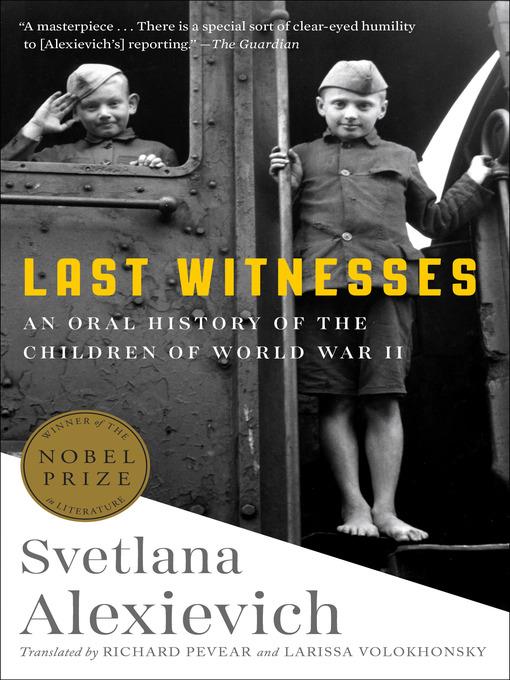
Last Witnesses
An Oral History of the Children of World War II
کتاب های مرتبط
- اطلاعات
- نقد و بررسی
- دیدگاه کاربران
نقد و بررسی

February 1, 2019
Nobel Prize winner Alexievich, whose oral histories of World War II (e.g., the multi-best-booked The Unwomanly Face of War) have given us a whole new understanding of that cataclysm, especially in the Soviet Union, now focuses on the wartime lives of children. The men and women interviewed for this book recall their youthful experiences as both witnesses to and participants in the fighting, clarifying the suffering that shaped a generation--and a nation. With rights sold in 47 countries.
Copyright 2019 Library Journal, LLC Used with permission.

May 6, 2019
In this moving work of oral history, originally published in 1985 and appearing in English for the first time, Nobel-winning journalist Alexievich collages together WWII survivors’ accounts. The book brings together engrossing and frequently graphic testimonies from 101 Russians who were under the age of 15 at the time of the events described. Absent a historical timeline—or, indeed, any prose in Alexievich’s voice—there is a subtle chronological and geographic movement; the memories move from town to town between the German invasion of the Soviet Union in June 1941 and the Nazi surrender in May 1945. The interviewees recall the hunger not assuaged by grass or potatoes, the sounds and the smells of war, the abuse they suffered (one was used to detect mines and another, then six, suffered “nine bullet wounds”), the crushing losses (“I never found my mama and papa, I don’t even know my real last name”), and the horrifying events (“Our neighbors... were hanging from the well pole,” one recounts; another remembers seeing his mother shot to death in the street). This disturbing and inspiring literary monument to the human, humane spirit that survives unimaginable horror brings to life the devastation of war. Agent: Galina Dursthoff, Literary Agency Galina Dursthoff.

May 15, 2019
The Nobel laureate brings her unique style of collecting firsthand memories to the stories of those who were children during World War II. Like all of Alexievich's (The Unwomanly Face of War: An Oral History of Women in World War II, 2017, etc.) books, this one makes for a difficult but powerful reading experience. The Nazis ruthlessly killed entire villages or took all the men who might be partisans out to be shot, transporting women and children to concentration camps. One universal memory of these children was the complete lack of color: Everything was gray or black; spring never arrived. Many raged that they never had a childhood, which was stolen from them. As one 13-year-old recounts, "I learned to be a good shot....But I forgot my math...." The children were not immune to Nazi tortures, and the author does not hide that fact from readers. Even 70 years later, many couldn't bear to remember the horrors of separation, the killings, and the hunger, which was perpetual--many ate grass, bark, even dirt. One man said there were no tears in him; he didn't know how to cry. The ages of Alexievich's subjects range from 4 to 15 years, most in the younger range because the teenagers were usually taken for slave labor or shot. Children were sold as slaves to German farmers and worked to death, but one of the most heinous crimes has to be the Aryan-looking children's being taken to camps so their blood could be used for transfusions for injured soldiers. The stories of escaping to the East, many alone, are remarkable, especially as we see the total strangers who took them in and treated them as family. Strangers were all they knew, and it was strangers who saved them. There are some uplifting stories of parents finding their children after the war, but many never found anyone. As usual, Alexievich shines a bright light on those who were there; an excellent book but not for the faint of heart.
COPYRIGHT(2019) Kirkus Reviews, ALL RIGHTS RESERVED.

Starred review from July 1, 2019
No war, nor any drama of state, is worthwhile if it results in one tear from a child, says one of the epigraphs which begin this oral history of the lives of Soviet children during WWII. The narrators of Last Witnesses endured far more than tears, and this book provides a wrenching glimpse of the war's impact on civilians in what is now Belarus and its neighbors, where more than four-million people were killed. Alexievich (The Unwomanly Face of War, 2017), awarded the Nobel Prize in literature in 2015 for her work in this genre, presents their memories individually and chronologically, but the stories form a single narrative of suffering. Children lose parents to the front or the partisans, death or capture, permanently or temporarily. They are then raised by relatives, neighbors, orphanages, nobody. They eat dogs and fear the human-eating dogs left by the Nazis. They are captured, tortured, imprisoned. They join the struggle. Alexievich's narrators were forever shaped by the war. The sole evidence of Alexievich's presence is in her witnesses' retrospective attempts to explain their worlds. By the age of ten or eleven, one woman explains, we were men and women. (Reprinted with permission of Booklist, copyright 2019, American Library Association.)

























دیدگاه کاربران